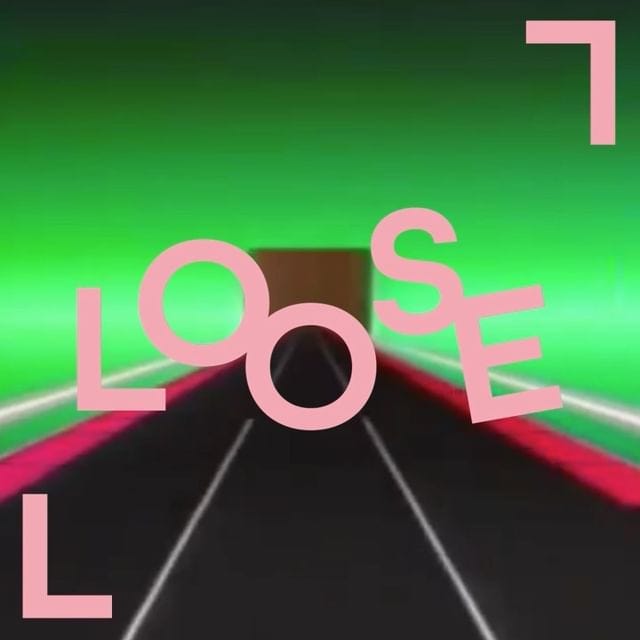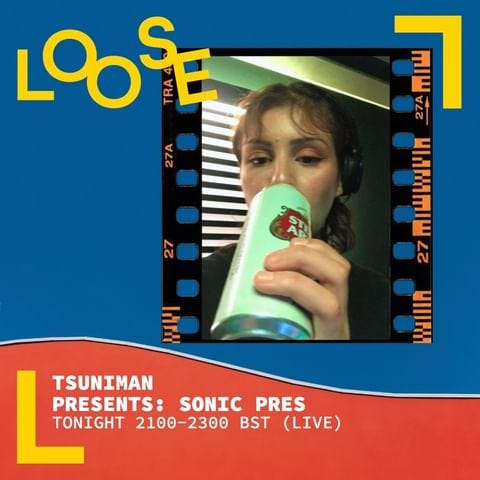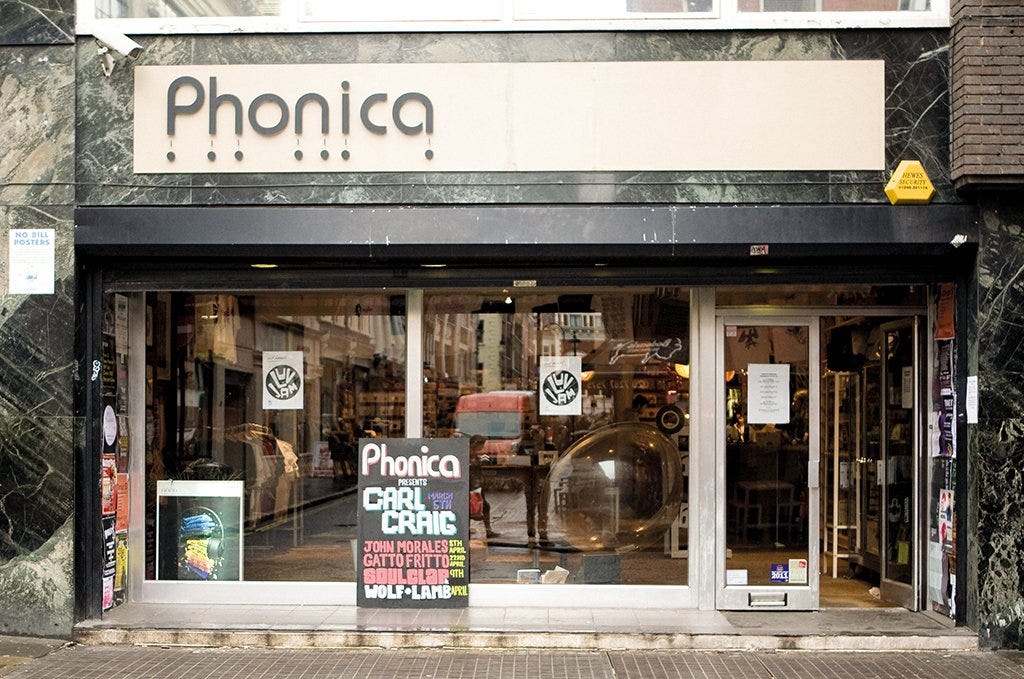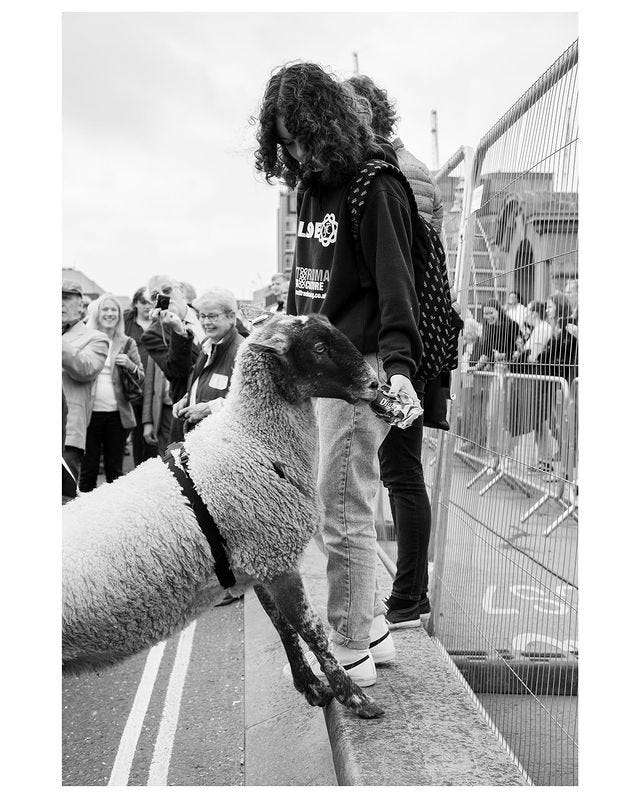Interviewing the founder of London's newest radio station
Plus spray paint, Spice Girls and ceremonial sheep
Before we start, a quick note to let you know that we’re taking a week off next week. After this Saturday’s roundup the next LiB will be on Monday 11 October. And now on with our scheduled programming…
In last weekend’s roundup we told you about Loose.FM a new online community radio station being broadcast out of a basement in Hoxton. For obvious reasons we like the idea of independent, community-driven, London-based media of any stripe, so we got in contact with the founder of Loose to ask him about the idea behind the station and quickly found ourselves in a conversation about the origins of disco music, the mental drain of digital devices, and why ‘amateur enthusiasm’ can be something to aspire to (amen to that!).
Who are you and how did you end up starting a new internet radio station for London?
This will be a long answer even in the short version so I’ll start with the easy part. My name is Mark and with my two partners Sarah and Tim I run a digital design and comms business. When I’m not doing that I’m generally preoccupied by the exploration of music: new sounds from new scenes, new sounds from old scenes, finding the groove often where you wouldn’t usually expect to find it, and making mixes and playlists where that connection of groove, rhythm and atmosphere can take us on a journey across different times, places and genres.
I’m also a DJ in my spare time and I’ve always been inspired by how the disco scene came about at those loft parties in the US in the early 70s, when DJs were spinning tracks for the dance floor with no focus on one genre, moving through latin, funk, psychedelia, soul, rock, whatever worked, to create an atmosphere. So what became disco music was a originally a casual multi-genre experiment (and the same can be said for the beginnings of house, techno, balearic beat, hip-hop, even). I love to try and capture that in my own playing: a bit of this and a bit of that, but whatever creates a vibe, really.
Staying in a narrow lane of genre doesn’t interest me, I don’t really get the appeal.
How did that approach to music turn into an ambition to create an actual radio station?
Well, this pandemic has been really tough for the design business, as it has for many people, but it’s woken us up to some revelations too. One is that we need to be more mindful with digital media, because it is mostly designed to pull your attention to a screen and then hold it there. It’s becoming clear that many people are finding a lot of mental discomfort due to the pull of their devices. Another revelation is that we need to be less wasteful in the creation of digital things from a sustainability point of view. We think a more minimal approach to digital can answer both of these things.
So the two areas we wanted to explore with Loose were: can audio play more of a part in replacing screen-time; and how can we take a more minimal approach to building digital things so that people don’t feel overwhelmed by their screens and also be better for the planet.
When we combined those two things, we figured we could and should create our own radio station using minimal design and very few channels. That gave us a base to experiment with the idea of html and radio, but it’s also, mainly, a grand piece of ambition fulfilment. We’ve always wanted to run a radio station, and now seemed like the right time to do it.
If this all makes it sound very serious, it really isn’t. We returned to that kind of music we like, that fun, genre-spanning of rhythm and groove, and agreed that we want to reflect a very open-minded appreciation of dance music, or music to dance to, or pause to in the gaps between the dancing.
So here we are. It’s called Loose, it’s broadcasting from Hoxton to the galaxy Tuesdays through Sundays, with the plan to go 24/7 when we’ve worked out how to run a radio station with some efficiency!
Why do you think London needs a new radio station? What's different about Loose?
It wasn’t so much that London needed a new station - I don’t think there’s such thing as too many - it was more that we needed to hear one.
Most music radio (in the traditional commercial or public broadcasting sense) is often too intrusive, with a lot of chat, personalities, egos, breaks for the news, traffic and weather, jarring musical changes or really narrow with regards to genre, or just too predictable.
Then there’s a lot of online-only radio stations, that are, again, very single-minded about genre, like a house and techno station, or ones that can be filed under “amazing but sometimes too challenging for the casual listener” such as NTS, Noods, Threads, Balamii etc. They’re all brilliant at what they do, but I don’t think we need another station with cutting-edge music being front and centre, as much as I love it myself.
We figured, if we start from that loose, groovy, house-party-centric, less hectic, very eclectic place, and then experiment from there; it may take us some place different. We’re not at that place yet because we’ve only just got started. But it’s the aim.
You describe Loose as a 'community' radio station. What makes it a community?
It’s a community station in several ways. From our basement in Hoxton we’re engaging with local communities and colleges to get more young local people involved in the running of it.
I’m also keen to find people who want to play music who are too shy to push themselves forwards, and maybe give them some anonymity if they require it. The digital world is set up for extroverts but there’s a lot of introverts who need a platform, so there’s a sense of community there.
I think there is a community of music fans and DJs, too, who want to hear and play music that’s for dancing, for feeling, but don’t pay lip service to genre purism. This is for them.
And then there’s the community of people who are running the station, none of whom have run a station before. I get excited by things that seem rough and ready and possibly about to fall apart. Hopefully our amateur enthusiasm with which we are approaching this audio tightrope walk will come across to the listener, at least in these early days.
How easy is it to set up a radio station in London? How have things changed from the pirate days?
We no longer need to climb up to the roof and guard our transmitter from the cops. What’s easy is setting up a Shoutcast stream, which I think anyone can do with a bit of rooting around on the internet.
But, to be transparent, there are a few financial barriers in the way of a good radio set up. You need decent gear: turntables, a mixer, CDJs, a proper sound desk, mics, monitors, a dedicated computer etc. You need a premises and power and you need to pay license fees to play music, which we do pay, but they seem ridiculous considering no one who is actually making the music seems to be getting paid very well anymore. We are looking at more ways to fund community radio so that we can encourage more of it.
What kind of DJs have you got lined up for the first few weeks?
We’ve got an excellent selection of DJs and selectors from around London and around the world, all bringing their interpretation of this concept of looseness, this open-minded approach to music for dancing. Some are established, some are totally new to radio, some are light and juicy, some are more confrontational, some are downright odd. But it’s all the kind of stuff we like to listen to here. It’s all Loose.
What are your ambitions for Loose now you’re up and running?
To keep it going! That’s the priority, first - to create a platform for the artists and listeners that we can maintain. But we want this to be a station that people can tune into and feel welcome, like walking into an amazing house party, so getting some sort of consistency to the vibe is the immediate ambition, without resorting to a consistency of sound.
In the longer term, we have lots of ideas around how to experiment with radio, particularly, with a core design simplicity at the presentation layer through the browser. Some of these ideas are interesting musically, and sonically. Some of them are ways to fund community radio for all, fairly and transparently for DJs and artists, without having to use advertising.
Oh, and cool sweatshirts and stickers and stuff. We’re working on some sick merch’.
We can't let you go without getting a few recommendations: What are your top picks for record shopping in London?
The first choice for me is always the counter at Phonica in Soho (above), where the staff are friendly and generous with their new music recommendations. There’s also a new wave of brilliant used record shops, like Lorenzo’s in Brockley, Hidden Sounds in Dalston and Yo-Yo Records on Hackney Road, who all seem to be tapping into the same vibey eclecticism as us here at Loose, and you can always leave with 10cm of goodness in a carrier bag and a smile on your face.
A special shout out needs to go the double-decker upstairs/downstairs of Palace Vinyl and Lovebeat in Crystal Palace, my local record shops which are always fun, friendly places to hang out and play records.
What are your favourite London gig venues?
It’s been so long since the start of the pandemic that I don’t even know with confidence whether the places I could name are still open, or what they’d be like now if they are.
I can give you some music recommendations though. I’m a bit late to this party but I’ve been listening to a lot of A92, an Irish drill collective who sound like they’ve arrived in 2021 in a time travelling spaceship after immersing themselves in the Bristol soundsystem scene of the late 80s, with members of the Wu-Tang navigating in the cockpit. There’s a producer I like called Will Hofbauer who makes electronic music that’s really danceable but humorous and daft in a really welcome way (check out his EP Where Did All The Hay Go?).
The new Anthony Naples LP is amazing. I like that new Kings of Convenience album. There’s a track on that called Fever that I’ve played to death. I’m afraid we’ll need another interview to cover this topic, once I’ve started talking about the music itself, there’s so much good stuff out there it’s impossible to stop…
You can listen to Loose live here. Follow them on Instagram for schedules and updates. And listen to past shows on Mixcloud.
And the rest
In our Back to the Future issue a couple of weeks ago we told you about the facing the Nine Elms & Battersea development, most of which were being caused by R&F, the Chinese developer on which much of the area’s regeneration is dependent and which is coming under “increasing pressure over its debt level from the Chinese government, from whom some of the loans stem”. This week it was reported by the Telegraph that Chinese state-owned bank Citic group and Lloyds Bank have loaned £430 million to the company “to cover the remaining costs related to the first phase of the Nine Elms development which will involve the construction of 600 new apartments.”
Meanwhile, over in Peckham, a terrace of “London's first custom-build homes” has been created. The idea is that you buy “an airtight, watertight, structurally sound shell” and then the rest is over to you. The developers are at pains to stress that this is definitely not about “trying to maximise [their returns]” and more about giving buyers the “flexibility of a self-build home, but without much of the associated hassle.”
Last couple of bits of property news: According to estate agent Hamptons, house prices in London are going to remain sluggish (compared to the rest of the country) for the next two years or so at least; but rental prices in central London have shot up (around 9.6% in Shoreditch and 7.4% in Clerkenwell) as “office workers and employees relocate for work.”
The number of black cabs on the streets has nosedived since the first lockdown, and there will even fewer of them come the end of the year. The number of vehicles dropped by around 5,000, to under 14,000 over the last 18 months and rules making vehicles older than 12 years ineligible for licensing will take another 1,228 cabs off the road come November.
Dazed has made a short film, diving “into the world of London’s contemporary street art culture and sharing the stories behind a series of new murals by emerging street artists”.
We’ve not had any ‘luxury basement’ news for a few weeks, but here comes The Ritz to remedy that. The hotel is installing a new five-storey basement “with a new pool and spa area” as well as 53 more bedrooms. The cost? £300 million.
Spotify, the cutting-edge technology company that pulls in around $9 billion in revenue, has just launched something new for London… and it’s a bus tour. A Spice Girls bus tour no less! To be fair, they did recreate the bus from the movie (minus the flying) and pack it full of appropriately dressed Drag Race contestants. It doesn’t look like this will be a permanent feature though, more a one off PR stunt to mark the band’s 25th anniversary.
The annual sheep drive over Southwark bridge happened over the weekend and one of our favourite street photographers was there to capture it:





